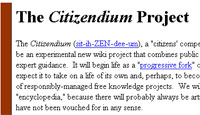 Unhappy with the inaccuracies of the online encyclopaedia he set up, Wikipedia co-founder Larry Sanger has announced that he will be launching an alternative to the free online reference this week.
Unhappy with the inaccuracies of the online encyclopaedia he set up, Wikipedia co-founder Larry Sanger has announced that he will be launching an alternative to the free online reference this week.
The free spin-off site, sporting the rubbish name of ‘Citizendium,’ will introduce user registration and editorial controls for user-submitted articles in an attempt to filter out pesky trolls, biased contributors and Tourettian troublemakers.
“Wikipedia is amazing. It has grown in breadth and depth, and the articles are remarkably good given the system that is in place. I merely think that we can do better,” Sanger said.
“There are a number of problems with the system that can be solved, and by solving those we can end up with an even better massive encyclopaedia,” he added.
An invite-only pilot version of the non-profit site will launch this week, although there’s no news about a full release.
The rise of Wikipedia
In five short years, the advert-free Wikipedia has become one of the most popular research tools on the Web, boasting more than 2 million articles in 229 nationalities, with Nielsen NetRatings registering more than 33 million unique visitors in September this year.
 Such is the explosive growth of the site, this figure represents a whopping 162 percent rise from the same period last year.
Such is the explosive growth of the site, this figure represents a whopping 162 percent rise from the same period last year.
With anyone able to write and edit content on Wikipedia, the site has been accused of unreliability, with controversial topics and some political entries being bogged down by never-ending disputes from warring factions.
Sanger has accused Wikipedia of failing to keep a grip on its writers and editors, commenting that the latest articles don’t represent a consensus view, just a reflection of what the most persistent ‘posters’ say.”
Larry Sanger hopes to introduce some order to his rival site by introducing editors, volunteer ‘constables’ and personal accountability which will see people using real names.
Although the site will be open to submissions from anyone, editors will be empowered to authorise articles with “constables” charged with wading into rows and asking, “why can’t we all just get along?” Or something .
With backing from an unnamed foundation, Citizendium hopes to evolve with public participation, growing from a “fork” of the open-source code of Wikipedia, with new content replacing existing content until it grows into a new compendium of its own.
The Citizendium Project
Toward a New Compendium of Knowledge